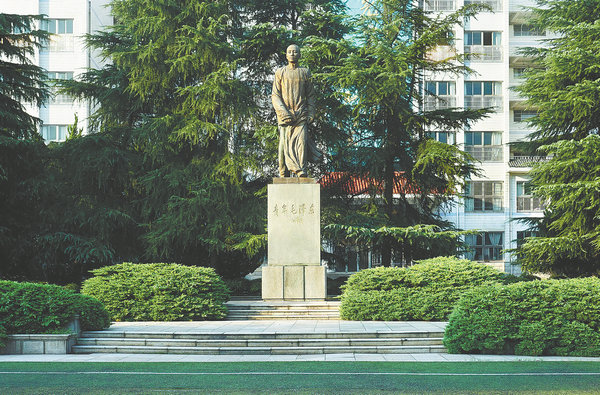

Mao studied at the school from the spring of 1913 to the summer of 1918. After graduation, he served as the executive principal of the school's attached primary school and taught Chinese in its teacher-training department.
During his eight years at the school, Mao set the ambition of "transforming China and the world".
He studied with great eagerness and achieved a firm foundation of knowledge, undertook arduous physical exercise to strengthen his will and spent most of his school breaks on study tours across the country, conducting extensive research on society, especially on workers and farmers. He founded the Xinmin Institute in order to explore the way of saving the nation.
The social practices had laid the foundation to nurture his influential ideas — knowledge begins with practice — and were important to deal with problems in rural areas.
The classroom where Mao attended lectures was restored, and the well where he used to take cold showers in winter to toughen his spirit has been preserved.
At his dormitory, Mao proposed three rules with his roommate: They would not discuss money, trivial family matters or relationships.
Now students at the university can watch a TV series about Chairman Mao in the first week of college life, according to Yang Dan, head of the exhibition hall.
A team of about 150 student volunteers serve as tour guides to cope with the large visitor influx.
He Xinrou, 16, joined the team last year. She is studying for a six-year free undergraduate degree to teach in rural areas.
The government pays for her tuition and accommodation fees, and offers monthly subsidies. She is expected to return to rural areas in her hometown in Loudi, Hunan.
She says she wanted to become a teacher since childhood, and serving as a tour guide has reaffirmed her determination to become a rural teacher.
Liu Xiangzi, 15, is also a volunteer guide. As she learns more about Mao's life, she is more determined to serve the country by teaching students in rural areas in her hometown of Hengyang in Hunan.
"Many people believe that conditions in rural areas are not as good as in urban areas, but I believe it can help strengthen my mental prowess, and I can also make a difference there," she says.